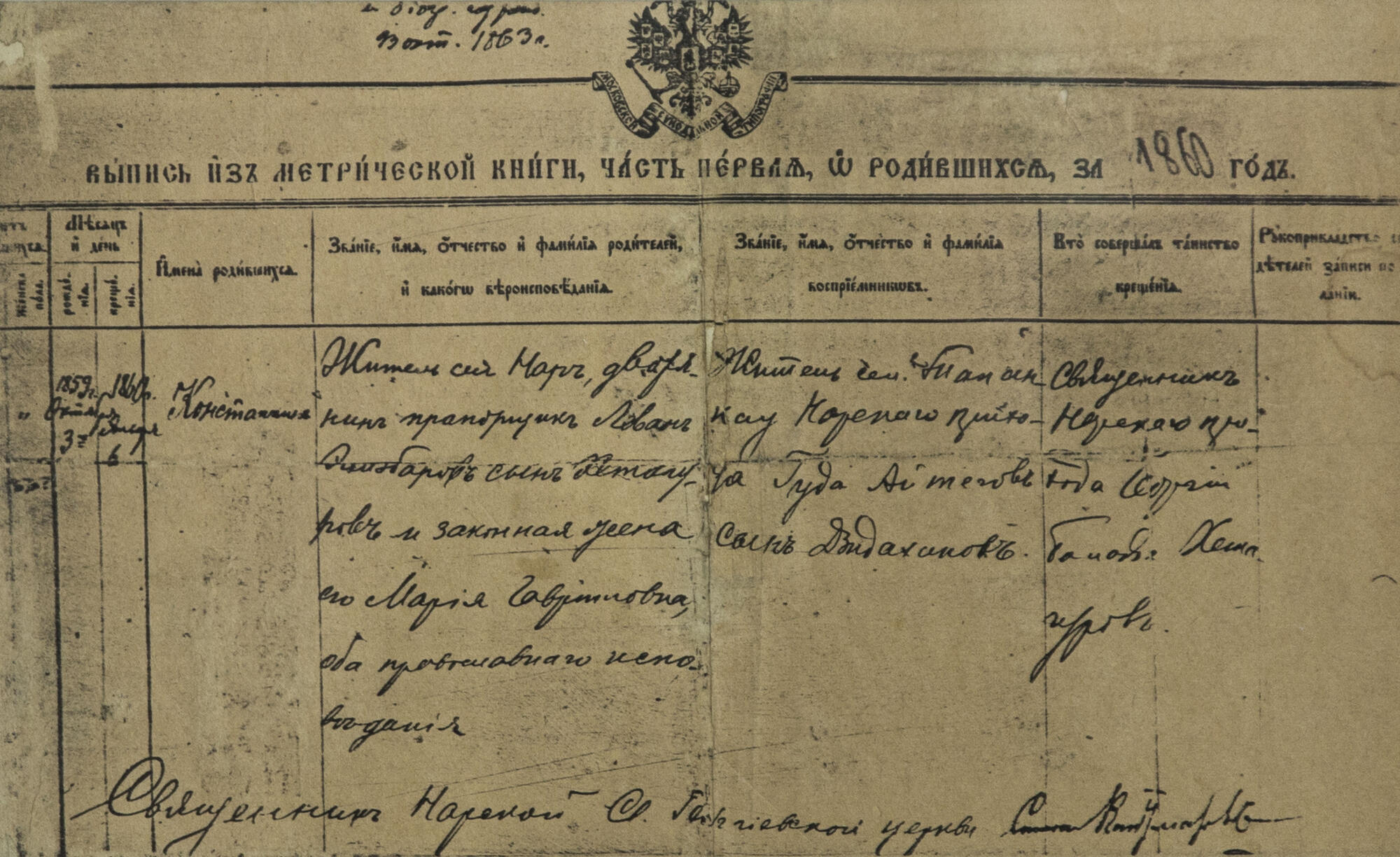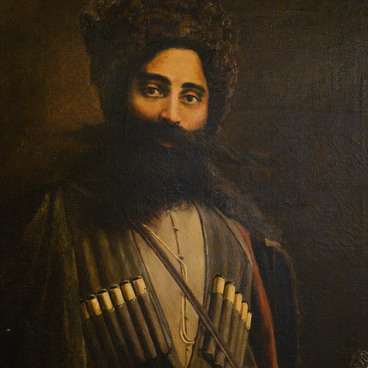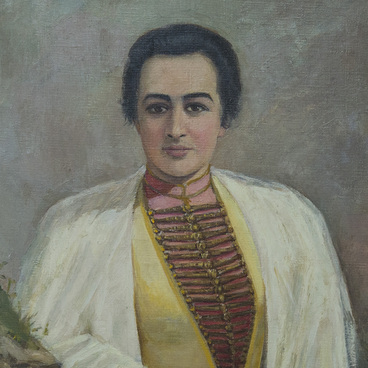The Kosta Khetagurov’s first biographers — Gigo Dzasokhov, Georgiy Baev, and many others — mistakening took the poet’s birthday to be in 1862 or 1863. In fact, Kosta was born on October 15th (by the new calendar) in 1859 in the village of Nar.
The exact date of Khetagurov’s birth was established by an extract from Nara Church’s records, which were translated into Georgian in 1860. They were translated into Russian in 1911 by Avraam Totiev, a second-grade schoolteacher in the village of Nar.
The entry reads: “Konstantin, son of Ensign Levan Elizbarovich Khetagurov and Maria Gavrilovna Gubayeva-Khetagurova, was born on October 3rd, 1859. The recording was made on January 6th, 1860. Signature of the priest of Nara”s” St. George’s Church Today, the original document is kept in the archive of the North Ossetian State Institute for Humanities and Social Research (SOIGSI) named after V. I. Abayev, in the Kosta Khetagurov Foundation.
Despite the fact that the Khetagurovy were a respected family in the village of Nar and far from poor, Maria Gavrilovna gave birth to her son in a barn. Later, Kosta himself wrote about this in the essay ‘Person’: ‘Despite the fact that my father and mother belonged to a “strong “and " big’ “family namein the Nara Basin, and my father, in addition, was an officer of the Russian armed forces, I was still born in a “manger”, in a barn. And it is unlikely that there is anyone in the entire Nara Basin who was not born in a barn either before me, and long after I was born. This is explained by the fact that in the time of “Person”, there was absolutely no other place in the Nara Basin that was more convenient, more isolated, for this greatest act of nature.’
Births were difficult. A relative of the family, Kodzian Dzaparova recalled: ‘On that terrible day and terrible hour, Kosta was born. For three whole days, she was “lost” in childbirth. The whole family and the whole village gathered around her. Her condition was difficult, and she lay in a barn.’ The childbirth undermined Maria Gavrilovna’s health, and she died soon afterward.
Levan Khetagurov took little Kosta to the village of Tsmi and gave custody over him to his cousin Chendza Dzaparova — “A woman with golden heart and good character, she gave herself to the upbringing of the child”. It was she who gave Kosta an interest and love for Ossetians folk arts: fairy tales, songs, and lullabies. Kosta lived in the Dzaparov, who loved and indulged the orphan in every way, for about five years. Subsequently, the poet dedicated important lines of his poem “Who are You?” to Chendza:
The exact date of Khetagurov’s birth was established by an extract from Nara Church’s records, which were translated into Georgian in 1860. They were translated into Russian in 1911 by Avraam Totiev, a second-grade schoolteacher in the village of Nar.
The entry reads: “Konstantin, son of Ensign Levan Elizbarovich Khetagurov and Maria Gavrilovna Gubayeva-Khetagurova, was born on October 3rd, 1859. The recording was made on January 6th, 1860. Signature of the priest of Nara”s” St. George’s Church Today, the original document is kept in the archive of the North Ossetian State Institute for Humanities and Social Research (SOIGSI) named after V. I. Abayev, in the Kosta Khetagurov Foundation.
Despite the fact that the Khetagurovy were a respected family in the village of Nar and far from poor, Maria Gavrilovna gave birth to her son in a barn. Later, Kosta himself wrote about this in the essay ‘Person’: ‘Despite the fact that my father and mother belonged to a “strong “and " big’ “family namein the Nara Basin, and my father, in addition, was an officer of the Russian armed forces, I was still born in a “manger”, in a barn. And it is unlikely that there is anyone in the entire Nara Basin who was not born in a barn either before me, and long after I was born. This is explained by the fact that in the time of “Person”, there was absolutely no other place in the Nara Basin that was more convenient, more isolated, for this greatest act of nature.’
Births were difficult. A relative of the family, Kodzian Dzaparova recalled: ‘On that terrible day and terrible hour, Kosta was born. For three whole days, she was “lost” in childbirth. The whole family and the whole village gathered around her. Her condition was difficult, and she lay in a barn.’ The childbirth undermined Maria Gavrilovna’s health, and she died soon afterward.
Levan Khetagurov took little Kosta to the village of Tsmi and gave custody over him to his cousin Chendza Dzaparova — “A woman with golden heart and good character, she gave herself to the upbringing of the child”. It was she who gave Kosta an interest and love for Ossetians folk arts: fairy tales, songs, and lullabies. Kosta lived in the Dzaparov, who loved and indulged the orphan in every way, for about five years. Subsequently, the poet dedicated important lines of his poem “Who are You?” to Chendza:



